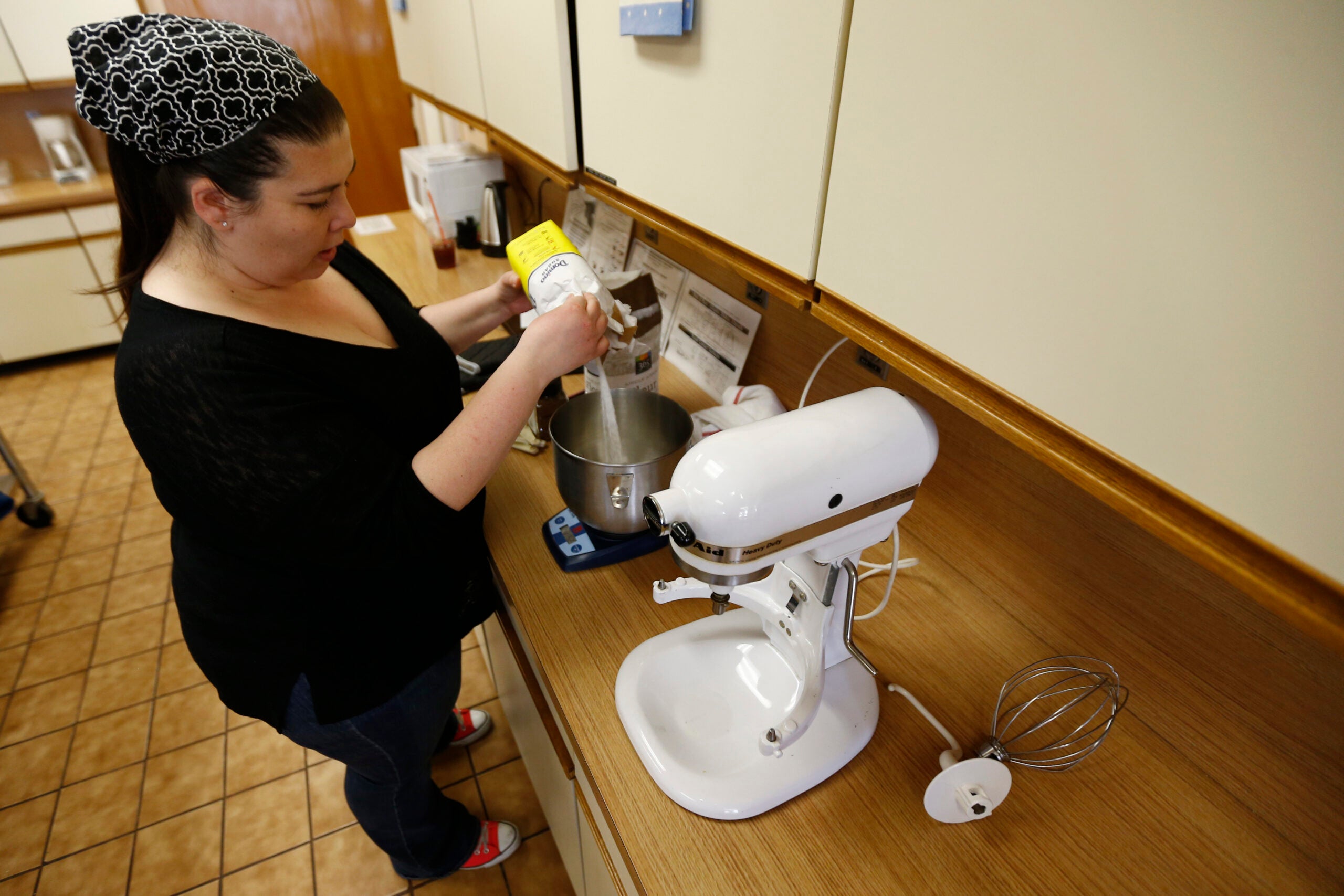Colleen Boehm from Sussex, Wisconsin says her 15-year-old daughter Ellie started experimenting with new baking recipes while spending more time at home last year during the coronavirus pandemic.
That’s where Ellie discovered a recipe for macaron cookies.
“She had a few flawless batches that came out, and they’re very finicky cookies. So I think she just got the bug for how good these could be,” Boehm said.
Stay informed on the latest news
Sign up for WPR’s email newsletter.
Boehm said Ellie had the idea to turn the baking project into a business, Miss E’s Sweet Treats, when she started getting requests to sell the cookies after making them for her birthday party.
Boehm said she felt confident her daughter’s new business was allowed under a state licensing exemption for homemade baked goods.
That is until she received an email from the executive director of the Wisconsin Bakers Association.
“She said that what my daughter was doing was illegal,” Boehm said.
In response, Boehm joined the Wisconsin Cottage Food Association, which is now suing the state Department of Agriculture, Trade and Consumer Protection over restrictions on the sale of homemade baked goods and other food items.
The lawsuit is a continuation of a legal fight from 2016 when three farmers and home bakers sued the agency over the state’s ban on the sales of homemade breads, cookies and other baked goods — items that are recognized as “not potentially hazardous” and shelf-stable.
In 2017, a Lafayette County judge ruled in favor of the home bakers, saying the restrictions were unconstitutional and primarily served business interests instead of public health concerns.
But the original plaintiffs, along with several new producers and the Cottage Food Association, are now arguing the way DATCP has interpreted that ruling again places unfair limits on at-home producers.
“The understanding of that lawsuit is really widely divergent from one community to the next,” said Kriss Marion, owner of Circle M Market Farm and bed & breakfast and one of the original plaintiffs. “In some cases, people are really downright bullied. Businesses that thought they were legal really run into a lot of trouble. And we just want to clear up the confusion.”
Current guidance from DATCP says the licensing exemption “applies only to flour-based ‘baked goods’” as indirectly defined in the state’s legal definition of a “bakery.” That definition is any place that makes “bread, crackers, pasta or pies, or any other food product for which flour or meal is the principal ingredient.”
Nonprofit law group the Institute for Justice, which is representing Marion and the other producers, filed a motion under the original lawsuit, saying DATCP’s guidance unfairly narrows the judge’s original ruling.
A DATCP spokesperson declined to comment on the new lawsuit. But Steve Ingham, the agency’s food and recreational safety administrator, said the current guidance is the state’s “best attempt to understand what was written by the judge” in the original lawsuit.
“We basically looked at all of the writings that the judge had provided from the decision. There were several documents that went back and forth with the judge trying to determine the scope of the decision. And then we honed in on keywords,” Ingham said.
Ingham said creating guidance based on a court ruling is unusual for the agency, which he said is mainly focused on writing and enforcing rules to interpret state law. He said DATCP cannot create rules unless they’re specifically authorized by state statute.
“So if change in this arena is going to happen, if it happens by the statutory or by the normal route, we will enforce it as it is written and intended. It’s unfortunate that it ends up in the judicial or the lawsuit side of things rather than working out through the statute and rule process,” Ingham said.
Marion said she believes DATCP has been put in a tough position by the state Assembly, which refused to act on cottage food legislation, nicknamed the Cookie Bill, which passed unanimously by the state Senate in 2014 and 2015.
“We know that this is a popular measure. We realized it was lobbies. It was lobbies that were holding this back and the power that those lobbies hold over legislators who they donate to,” Marion said. “There are big players at work who want to box small players out of this business. And the fact is your wonderful 15-year-old’s macaron business is not going to hurt a brick and mortar bakery in your community.”
She said the cottage food producers are also hoping to open up opportunities outside of traditional baked goods by filing a new lawsuit against DATCP. It asks the court to strike down what they say is an arbitrary ban on other shelf-stable food items like candies, donuts and roasted coffee beans.
Boehm said she believes the pandemic has heightened the need for Wisconsin residents to have ways to earn money at home through cottage food businesses.
“We live in a time in our communities when finances are really hard and jobs are being lost,” Boehm said. “So if somebody has a great kringle recipe or donut recipe or whatever and they want to sell that to support their family, they need to be able to do that. Especially because so many of these cottage food producers are women. So they are doing it alongside virtual schooling their kids or homeschooling their kids or caring for aging parents.”
Jessica Hoover, executive director of the Wisconsin Bakers Association, said she sent the letter to Boehm because some of the fillings listed on her daughter’s Facebook page “included heavy cream and egg nog”.
“While there are many fillings that are not-potentially hazardous, these ingredients cannot safely remain unrefrigerated,” Hoover said in an email to WPR.
Hoover said her organization supports all cottage industry bakers “provided that the laws regulating them are no different than licensed retail bakeries,” including licensing, inspections, insurance requirements and taxes.
Wisconsin Public Radio, © Copyright 2024, Board of Regents of the University of Wisconsin System and Wisconsin Educational Communications Board.






